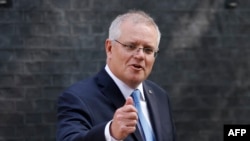SYDNEY — Australia has imposed fresh sanctions on wealthy Russian entrepreneurs because of the Kremlin’s invasion of Ukraine. The move is part of Australia’s strategy to penalize people of economic and political value to Russia.
The latest round of Australian sanctions targets Russian oligarchs, or wealthy businesspeople thought to have close ties to the Kremlin.
They include the prominent billionaire Roman Abramovich, the British-based owner of Chelsea Football Club, one of European soccer’s most successful teams. He has always denied any close affiliation with Russian president Vladimir Putin.
Abramovich is among more than 30 individuals sanctioned by Australia. They include the chief executive of Russian energy company Gazprom, Alexey Miller, and the head of Bank Rossiya, Dmitri Lebedev.
Targeted financial sanctions and travel bans against Abramovich, who is one of the richest men in the world, bring Canberra in line with measures taken by British and U.S. authorities.
Australian foreign minister Marise Payne said in a statement that “many of these oligarchs have facilitated, or directly benefited, from the Kremlin’s illegal and indefensible actions in Ukraine since 2014.”
Ukrainian community leaders have welcomed various penalties imposed by Australia on Russia since its invasion of Ukraine.
Canberra has spent $50 million on missiles and ammunition for Ukrainian forces.
But Dmytro Matsypura, a Ukrainian-born associate professor at the University of Sydney Business School, wants Australia and its allies to impose a no-fly zone over Ukraine to stop Russian aerial attacks.
“Our army is very brave, and they will fight — fight until the end, but what we need is (the) help of (the) international community and that includes the military hardware, and it also includes protecting the civilians,” Matsypura said. “So, at the moment our main message is to protect the civilians and to help close the sky from the Russian bombs and Russian attacks and Russian missiles.”
Australian prime minister Scott Morrison said Monday the invasion of Ukraine, and the pressure it has put on gas supplies, would make the world assess alternative sources of energy.
Morrison said the conflict would provide opportunities for Australia’s growing hydrogen industry that can power cars and homes.
“Right now, we are seeing the world re-evaluate where it gets its energy from because of the war in Europe. 40% of Europe’s gas is dependent on Russia and, so, major advanced economies in the world today are considering again what their supply chains are,” he said. “(The) Japanese government is keen to continue to develop our hydrogen projects and partnerships with them, and that is only heightened by the uncertainty we’ve seen.”
Australian sanctions are part of a U.S.-led campaign to financially isolate Russia and disrupt its financial institutions.





